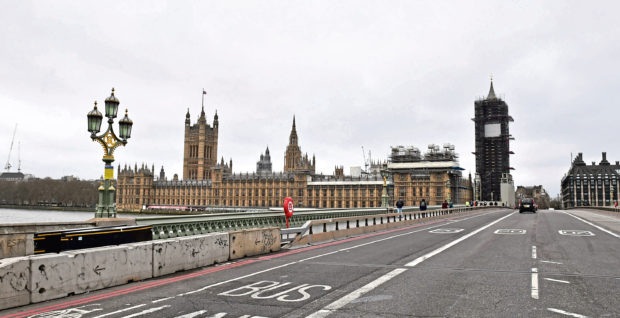We are used to sniping from Belfast and Edinburgh, but the virus has brought a new critic of the Union – London. Faced with the reality of the British constitution, Downing Street fumes.
Behind the black door of No 10 they have finally come to realise that the PM is not totally in charge, and it irritates. Unable to grandstand as Churchillian leaders, the Tories attack the devolved administrations. It’s all very odd, but points in a very different direction to the current attacks on Nicola Sturgeon.
The FM is accused of using the crisis to promote independence. It is a clumsy attempt to shift focus from the incompetence of Johnson’s government.
On Tuesday May 5, Downing Street spin doctors over-egged a briefing, allowing newspapers to think lockdown would soon end. Immediately regretting the next day’s headlines, the PM’s crew came up with another wheeze. They’d get Johnson to set the record straight in a broadcast message to the nation.
What occurred was a caricature of an irate middle manager. Artificial emphasis, jabbing fists and a message that didn’t make sense. The nation it was aimed at, England, didn’t understand what it meant. The other nations found it an irritating distraction.
Yet again, Johnson’s clownish ways compared badly with the calmer approach being taken in the three devolved nations.
Downing Street was irritated that Johnson’s great moment came across as foreign in Scotland, Wales and Northern Ireland. The message wasn’t for them, which immediately devalued it. Here was a leader preaching about powers he didn’t hold and decisions which did not apply.
This seems to have provoked spin doctors to brief against Sturgeon. Not because this would help tackle the virus, but it might give the media a new target to blame. Anonymous quotes abounded from London government sources attacking the FM’s trustworthiness and implying she was grandstanding.
Yet the Sturgeon-as-Guy-Fawkes theme didn’t catch on outside London’s media. Many Scots found the idea silly. They may have quietly hated Nicola for not lifting lockdown, and noted the growing evidence, from care home deaths to the Nike conference debacle, that the Scottish Government was failing, too, but the idea that Nicola was posturing simply didn’t ring true.
Unlike Johnson, she came into politics with a strong sense of public service and belief in government. She has discovered the cost of that service and the limits of bureaucracy. What’s more, after six years of caution on indy, it wasn’t credible that this serious person would use the death of others to suddenly up the ante.
Sturgeon is required by law to govern health services in Scotland. The UK-wide approach was to protect the NHS by flattening the curve. Sturgeon attempted just that. Her initial faith in London led her to align policy with Downing Street. Hence poor choices about scrapping tracing and sending elderly patients to care homes.
Her subsequent decision to continue lockdown while Boris was loosening it was driven by a new reality, that London really didn’t know best, and the hugely upsetting disaster of deaths in care homes.
There have been interesting constitutional aspects to the virus, but the push for indy is not one. The phrase “four nations” to describe the UK is significant. It captures the reality of the British constitution. Different parts are responsible for different things. If you didn’t know this already, you do now.
Despite London’s disappointment at this, there is no sign anyone in Scotland, Wales or Northern Ireland would change devolution. However, the north of England may work harder to get its own powers, as local government has been unimpressed by England’s centralised approach.
The London-based media still struggle with the reality of Britain. They think they tell a national story, when often it’s just a metropolitan one. Thus briefing a London hack can have a distorting effect on the reality of a four nations political story. Much as a national broadcast is really no such thing.
Many Scots were angry that Boris boomed into homes with, in effect, rebellious intent. That Tories then briefed against the Scottish Government approach was crass, and very bad politics.
Tory nationalism has been rebuffed at the borders, but it may have been strengthened in its own right. London now has Edinburgh and Cardiff to blame, alongside Brussels. The Leave project looks ever more Anglo.
Remember, this is not a Britain made by the SNP, but shaped by the Tories. Since 2010 the substantial increase in devolved powers, and the drive for a Northern Powerhouse in England, is all the work of Conservative governments.
What irks Tory ministers is that devolved governments may call the shots on health but London alone carries the can for macroeconomic policy. Boris et al have to worry about the whole picture in a way that is not true of the other three nations.
The real “Union” story from the virus is that Tories may want to increase the fiscal responsibility of the devolved nations, so the unhelpful Celts can feel what’s it like to really govern. Not so much bad Sturgeon, then, as petulant Johnson.

